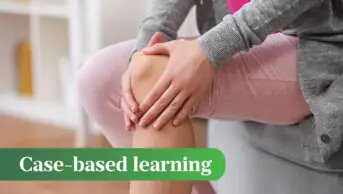We want to highlight an important issue in the recent article — ‘Antibiotics for back pain — a viable treatment option or pathway to antimicrobial resistance?’ — published in The Pharmaceutical Journal on 6 November 2025, authored by Margaret McCartney and Deborah Cohen.
The article was aimed to critically review the argument stated by Persica Pharmaceuticals, which claimed that certain types of chronic low back pain with Modic change 1 (MC-1, detected on magnetic resonance imaging) in adjacent vertebrae can successfully be treated with antibiotics, either by oral administration or with injections in the disc.
Based on our national multicentre randomised controlled trial1, we were interviewed by McCartney and Cohen during the process and had the opportunity to delineate critical views on this topic, based on both our own research and on analysis of current studies on antibiotic treatment of low back pain.
The important issue is that the hope of treating chronic lower back pain with antibiotics is to reduce, or eliminate, pain in the lower back, but the “evidence” of antibiotic effect in patients with chronic lower back pain with MC-1 is very weak. It rests on only one study by two of the founders of Persica Pharmaceuticals2.
A Norwegian study aimed to replicate that study, by using a relevant randomised controlled trial3,4. The difference in pain reduction they found after one year between antibiotics and placebo was clinically irrelevant (0.7 units on the numerical rating scale [NRS] ten-point scale) and statistically non-significant.
Even in secondary subgroup analysis using short Tau inversion recovery (STIR) images investigating the largest and most oedematous MC-1, the difference between antibiotics and placebo was still clinically irrelevant (one on the ten-point scale) and statistically non-significant5.
We argue that findings in studies by independent researchers have demonstrated that antibiotics for individuals with chronic lower back pain and MC-1 is an ineffective pain treatment.
Antibiotic resistance, which is increasing by using antibiotics on unclear indications, is a big threat against our ability to treat even common infections at present and in the future6.
Considering this, we see no reason that lower back pain should be treated with antibiotics, either orally or by injection, on unproven clinical grounds.
Peter Fritzell, associate professor, Uppsala University. Futurum Academy for Health and Care, Jönköping. RKC Centre for Spine Surgery Stockholm, Sweden;
Tomas Bergström, professor and senior physician, Department of Clinical Microbiology, Sahlgrenska University Hospital, Gothenburg, Sweden;
Olle Hägg, Capio Spine Center Göteborg, Sweden.
- 1.Fritzell P, Welinder-Olsson C, Jönsson B, et al. Bacteria: back pain, leg pain and Modic sign—a surgical multicentre comparative study. Eur Spine J. 2019;28(12):2981-2989. doi:10.1007/s00586-019-06164-1
- 2.Albert HB, Lambert P, Rollason J, et al. Does nuclear tissue infected with bacteria following disc herniations lead to Modic changes in the adjacent vertebrae? Eur Spine J. 2013;22(4):690-696. doi:10.1007/s00586-013-2674-z
- 3.Bråten LCH, Rolfsen MP, Espeland A, et al. Efficacy of antibiotic treatment in patients with chronic low back pain and Modic changes (the AIM study): double blind, randomised, placebo controlled, multicentre trial. BMJ. Published online October 16, 2019:l5654. doi:10.1136/bmj.l5654
- 4.Bråten LCH, Grøvle L, Espeland A, et al. Clinical effect modifiers of antibiotic treatment in patients with chronic low back pain and Modic changes – secondary analyses of a randomised, placebo-controlled trial (the AIM study). BMC Musculoskelet Disord. 2020;21(1). doi:10.1186/s12891-020-03422-y
- 5.Kristoffersen PM, Bråten LCH, Vetti N, et al. Oedema on STIR modified the effect of amoxicillin as treatment for chronic low back pain with Modic changes—subgroup analysis of a randomized trial. Eur Radiol. 2020;31(6):4285-4297. doi:10.1007/s00330-020-07542-w
- 6.Aslam B, Khurshid M, Arshad MI, et al. Antibiotic Resistance: One Health One World Outlook. Front Cell Infect Microbiol. 2021;11. doi:10.3389/fcimb.2021.771510


